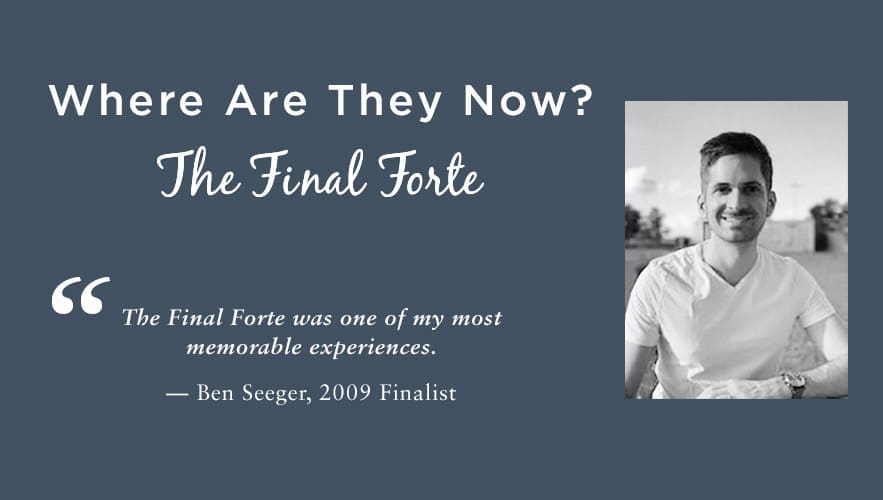From The Score Newsletter, Spring 2021
Ben Seeger is a Madison Metropolitan School District graduate, and was a finalist in the Final Forte competition in 2009 while a senior at Madison Memorial High School. His parents arrived in America well-educated, immigrating here from Germany with mathematics and medical degrees and a huge appreciation of music; all three children in the family studied privately — both piano and a string instrument.
Ben was a shy child but very bright and always attentive; he was the youngest of three in his family. At seven years of age and in his second grade music class, his music teacher discovered, quite by accident, that he had perfect pitch. She was teaching a lesson comparing major and minor music and how it makes the listener feel — through sounds, moods, feelings, movies. During the lesson Ben raised his hand, very much out of his characteristic quietness, and asked why she was demonstrating everything in the key of A, be it major or minor. When his teacher asked how he knew it was in the key of A, he carefully and quietly said “I don’t know.”
What a classic opportunity for the teacher! She turned the piano around so the keyboard wasn’t facing Ben and told the class they were going to play a game, and Ben was going to be the contestant! Ben, a tad embarrassed but intrigued, listened to what was going to happen next. The teacher played a key just above middle C and asked him if he could tell her the name of the pitch; he named it. She proceeded to play seven more pitches and he named six of the seven. The kids in the class were clapping along with the enthusiasm of his teacher! When finished she told him she thought he had a very special gift called “perfect pitch.” He was proud. The teacher was thrilled to have made the discovery!
He went home that day and told his mom, who began to research what all is involved and how it occurs, and she returned to the school to visit with the music teacher, giving her several articles she had found online about it. Everyone was excited with this discovery, especially Ben.
Ben began to study violin and, like his older sister, he soared. His instructor was equally impressed with his intellect, abilities and his wonderful musical ear.
With some encouragement, he competed in The Final Forte competition and became a finalist his senior year of high school. He invited his elementary music teacher to the concert that final night and beautifully performed, much to the pride of his family and teachers.
Ben then attended the University of Wisconsin, completing a double major in music and math. He received his PhD in mathematics from the University of Chicago and played chamber music on the side whenever he got the chance to do so. He is currently halfway through a postdoctoral position at the University of Paris-Dauphine.
When contacted about what he was doing now, and questioned about what part music played in his life, he had some wonderful reflections.
“There are so many people with talents in music and some other field (my wife, Ami, is another one; we were in the same violin studio at UW and she did a double major with biology), and such people usually face the difficult decision of what to focus on professionally. I got as far as my senior year of college still trying to make up my mind, and, although I eventually chose to become a mathematician, I continue to play music, and I imagine I always will. I try to find opportunities to play chamber music whenever I can, because that has always been my favorite.”
“The Final Forte was one of my most memorable experiences.”
“I will always be proud of my accomplishments and the level I reached as a young musician. On top of that, some skills that one attains through music, for example, dealing with performance anxiety or reacting well to constructive criticism, have transferred naturally to other parts of my life. Many people who do not have a musical background learn these skills much later, when it is harder to do so. In addition, creativity and open-mindedness certainly became a part of my personality as a result of my musical upbringing, although I could never quantify the extent to which that is true.”

